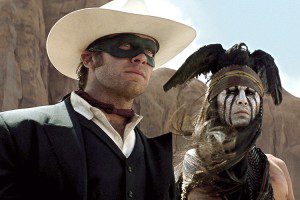 My friend and colleague Steven D. Greydanus tweeted the other day that the new Lone Ranger movie is not just one of those films that doesn’t “get” its source material but, rather, it is made by “people who do understand the source material—and dislike it.” He has since noted that this point is also made by New York Times critic A.O. Scott, who wrote that the film is “an ambitious movie disguised as a popcorn throwaway, nothing less than an attempt to revise, reinvigorate and make fun of not just its source but also nearly every other western ever made.”
My friend and colleague Steven D. Greydanus tweeted the other day that the new Lone Ranger movie is not just one of those films that doesn’t “get” its source material but, rather, it is made by “people who do understand the source material—and dislike it.” He has since noted that this point is also made by New York Times critic A.O. Scott, who wrote that the film is “an ambitious movie disguised as a popcorn throwaway, nothing less than an attempt to revise, reinvigorate and make fun of not just its source but also nearly every other western ever made.”
This got me wondering about other films that have knowingly inverted their source material, rather than adapted it, per se — i.e., films that have explicitly challenged the themes of their source material. Two examples came to mind immediately.
First, there is Alex Proyas’s adaptation of Isaac Asimov’s I, Robot (2004). As I wrote in one of my reviews of that film (but see also this review):
The key issue here is whether human safety is ultimately the highest good, and in this, the film completely turns Asimov’s vision on its head—and justifiably so, I think. Asimov’s book ends on an almost utopian note, as machines assume more and more control over the world and begin to manipulate things in a way that will prevent the human race from harming itself. For an atheist like Asimov, it seems benevolent machines were almost a substitute for God—potentially all-powerful beings who would not allow evil if they could help it, and who would use their supremely logical minds to save us from ourselves. (Such ideas were evidently in the air back then; compare this to the 1951 film The Day the Earth Stood Still, in which alien races achieve peace by handing control of their societies over to robots.)
I, Robot, however, suggests it would be a nightmare if humanity ever lost control of its fate like that . . .
Next, there is Alfonso Cuarón’s adaptation of P.D. James’ Children of Men (2006). As I wrote in my brief comment on that film:
Some of the changes the film makes to the story are rather drastic, and even work against the book’s Christian leanings; an act of euthanasia, made to look so vile and brutal and dehumanizing in the book, takes a more loving and merciful hue, here.
See also this blog post on how Cuarón consciously ignored the themes of the book so that he could focus on completely different themes that were of interest to him.
It also occurred to me that there are probably quite a few Bible epics that have done something similar, given that the filmmakers who made them and the audiences who watched them didn’t necessarily share the perspective of the original texts.
For example, Bruce Beresford’s King David (1985) concludes with David on his deathbed telling Solomon, “Mark this above all: Be guided by the instincts of your own heart, no matter what the prophets tell you, for it is through the heart, and the heart alone, that God speaks to man.” But the biblical David told Solomon to “observe what the Lord your God requires: Walk in obedience to him, and keep his decrees and commands, his laws and regulations, as written in the Law of Moses.”
(That scene at the end of Beresford’s film is made all the funnier by the fact that David complains a scribe is recording “every word I utter”, to which the prophet Nathan replies that David himself said he wanted everything recorded in “the Book of Samuel”. But the biblical David’s last words — apart from being very different from what he says in the film — actually appear in the Book of Kings!)
Anyway. Presumably there are lots of other films that have flipped the thematic concerns of their source materials on their heads, some more deliberately than others. Can you think of some other examples? And I’m not exactly thinking of straightforward parodies, here; I’m thinking of films that positioned themselves as adaptations of the source material but then actively subverted it.












